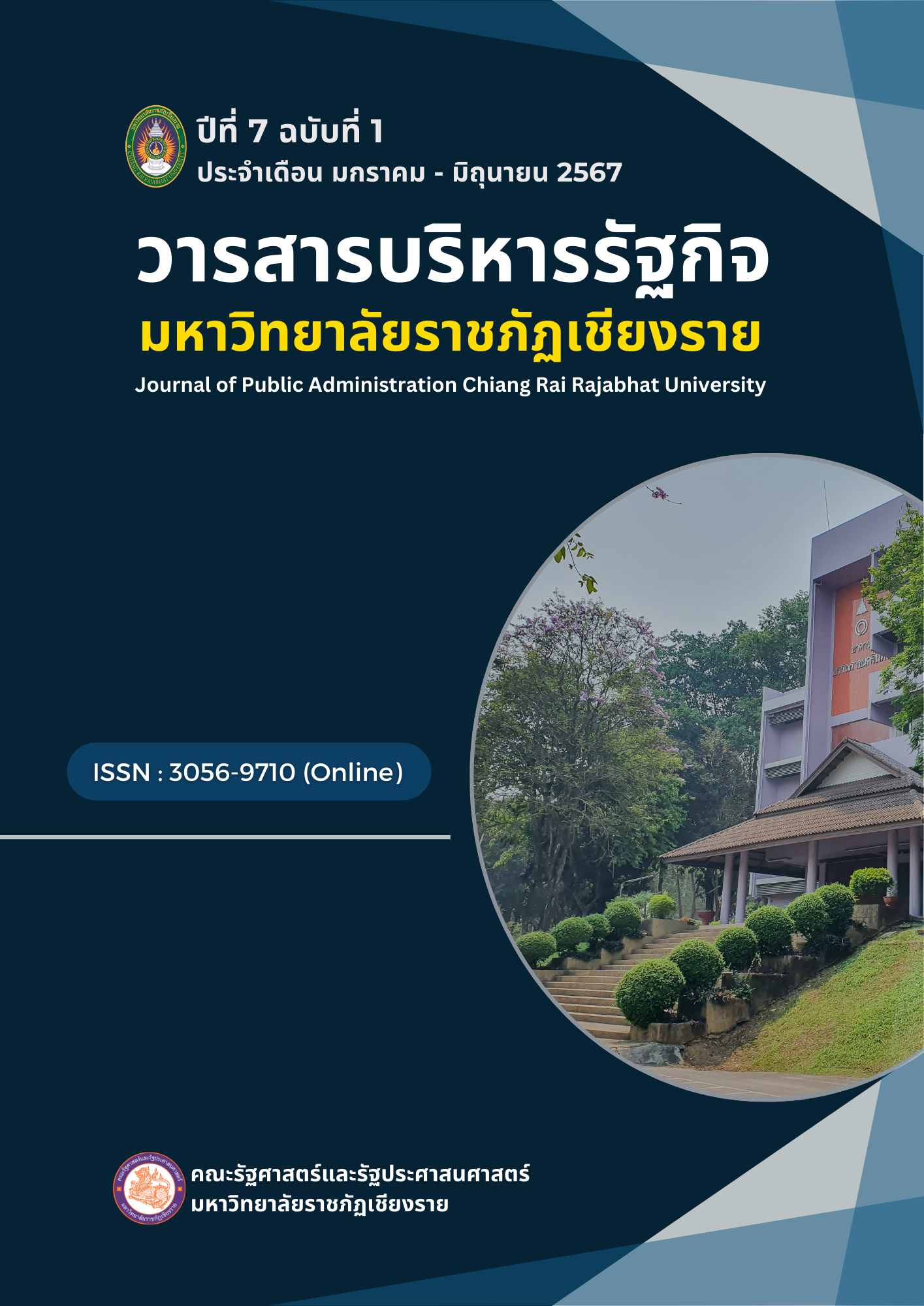Decentralization Reform for Unified Administration in Cambodia
Main Article Content
Abstract
This paper examines the imperative of restructuring the governance framework at the Subnational Administration (SNA) level in Cambodia to enhance responsibility and operational coordination. The purpose of study advocates for a unified administrative structure, driven by the delegation of functions and resources through deconcentration and decentralization by the central government. Utilizing a qualitative descriptive approach, the research draws on observation and literature review to analyze the current governance practices. The findings highlight that the Royal Government of Cambodia (RGC) has been actively promoting democratic development via decentralization, implementing organic laws for administrative reforms across different levels. The anticipated benefits of this restructuring include improved public service delivery, heightened accountability, better governance, enhanced fiscal decentralization, empowered local authorities, increased community participation, capacity building, and greater inclusivity. The process aligns with existing laws and regulations, bolstered by factors such as regulatory support and human resource development. Nonetheless, the study identifies challenges such as the timing of regulatory issuance and human resource allocation that must be addressed to optimize the restructuring efforts.
Article Details
References
Denhardt, J. V., & Denhardt, R. B. (2015). The New Public Service Revisited. Public Administration Review, 75(5), 664–672.
Dick-Sagoe, C. (2020). Decentralization for Improving the Provision of Public Services in Developing Countries: A Critical Review. Cogent Economics & Finance, 8(1).
Hun Sen, S. A. M. S. P. T. (2020). Concept note for the design of the second phase of the national programme on sub-national democratic development (2021-2030).
Norodom Sihamoni. (2008). Royal Decree on establishment of NCDD. Retrieved January 28, 2024, from https://ncdd.gov.kh/en/documents/royal-decree-on-establishment-of-ncdd/
Osborne, D., & Plastrik, P. (1997). Banishing Bureaucracy: The Five Strategies for Reinventing Government. Addison-Wesley Publishing Company, Inc.
RGC, R. government of C. (2001). Law on the Election of Commune/Sangkat Councils. The National Election Committee (NEC). Retrieved January 28, 2024, from https://www.nec.gov.kh/english/content/law-election-communesangkat-councils
RGC, R. government of C. (2019a). Sub-decree No. 182 on Functions and Structure of Municipal Administrations—OD Mekong Datahub. Retrieved January 28, 2024, from https://data.opendevelopmentcambodia.net/laws_record/sub-decree-no-182-on-functions-and-structures-of-town-administration
RGC, R. government of C. (2019b). Sub-decree No. 183 on the Functions and Structure of Khan Administration of Phnom Penh Capital—OD Mekong Datahub. Retrieved January 28, 2024, from https://data.thailand.opendevelopmentmekong.net/en/laws_record/sub-decree-no-183-on-functions-and-structures-of-district-administration-of-phnom-penh-municipal
RGC, R. government of C. (2019c). Sub-decree No. 184 on Functions and Structure of District Administration—OD Mekong Datahub. Retrieved January 28, 2024, from https://data.opendevelopmentcambodia.net/laws_record/sub-decree-no-184-on-functions-and-structures-of-district-administration
RGC, R. government of C. (2021). National Program on Sub-National Democratic Development Phase 2 (2021-2030)—OD Mekong Datahub. Retrieved January 28, 2024, from https://data.opendevelopmentcambodia.net/en/dataset/national-program-on-sub-national-democratic-development-phase-2-2021-2030
Rohdewohld, R., Carrasco, B., & Rahemtulla, H. A. (2022). Decentralization, Local Governance, and Localizing the Sustainable Development Goals in Asia and the Pacific. (1st ed.). Routledge.
Royal Government of Cambodia. (2012). Sub-decree no.68 on General Process of Transferring Function and Resource to local government. Royal Government of Cambodia (RGC). Retrieved January 28, 2024, from https://www.mcs.gov.kh/wp-content/uploads/
Royal Krom. (2001). Law on the Election of Commune/Sangkat Council. National Committee for subnational Democratic Development, NCDD.
Royal Krom. (2008). Law on the Election of Capital Councils, Provincial Councils, Municipal Councils, District Councils and Khan Councils. Ministry of Interior (MOI).
Smoke, P. (2015). Managing Public Sector Decentralization in Developing Countries: Moving Beyond Conventional Recipes: Decentralized Public Management: Moving Beyond Conventional Recipes. Public Administration and Development, 35(4), 250–262.
Sugiyono. (2014). Metode Penelitian Kuantitatif, kualitatif dan R & D / Sugiyono | OPAC Perpustakaan Nasional RI. Retrieved January 28, 2024, from https://opac.perpusnas.go.id/DetailOpac.aspx?id=911046#
Tarore, S., Andi, G., Mardiyono, & Nur, P. (2019). Organizational Restructuring of Manado City Government. Russian Journal of Agricultural and Socio-Economic Sciences, 89, 3–12.
Worldometer. (2023). Cambodia Population (2023)—Worldometer. Retrieved January 28, 2024, from https://www.worldometers.info/world-population/cambodia-population/


